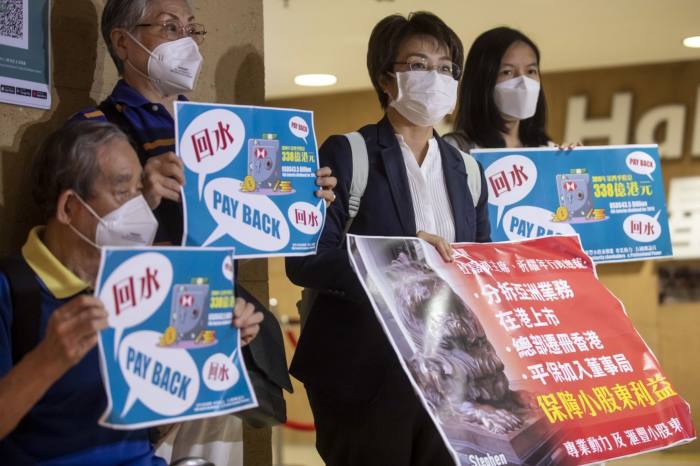
HSBC’s largest shareholder, Ping An, has called on the bank to be “much more aggressive” in reducing costs by cutting jobs and warned that its board lacks experience in Asia, as it pushes the lender to spin off its Asian business.
Michael Huang, chair of Ping An Asset Management, told the Financial Times it was “urgent” that HSBC goes further on cost cutting to bring down its expenses, which it said are far higher than its rivals, and said a number of senior bankers do not have sufficient experience of working in Asia.
Huang’s comments mark the first time the Chinese insurance company has spoken publicly about HSBC since it emerged earlier this year that it had privately urged the bank to hive off its Asian operations to boost returns. Ping An has a stake of more than 8 per cent in the bank.
HSBC, led by chair Mark Tucker, has pushed back against separating its Asian business, claiming it would be too complicated and incur huge costs.
A person familiar with Ping An’s thinking said the insurer was still pushing for a split and discussions were “ongoing.” Ping An started agitating for a break-up in February, complaining of years of underperformance by HSBC and about the cancellation of HSBC’s dividend during the coronavirus pandemic.
Ping An’s request for further cost cutting as well as a greater allocation of resources to Asia are among the measures the insurer believes will improve HSBC’s returns, although it has stopped short of publicly calling for a break-up.
The bank’s return on tangible equity, which Ping An said has averaged 7 per cent over the past five years, lags behind rivals. Huang said HSBC last year delivered returns of 8.3 per cent, which was “far below” the 12.3 per cent average of its peers.

Huang added that HSBC should “be much more aggressive in radically reducing its costs”, noting that its cost-income ratio of 64.2 per cent is 13 percentage points higher on average compared with its competitors.
Expenses could be lowered “by reducing its operating costs such as manpower and IT” as well as the cost of its global headquarters.
“This is the most important, urgent and absolutely needed action for HSBC to improve its business performance, reducing costs and increasing efficiency, particularly amid slowing growth in the global financial industry,” Huang added.
HSBC is aiming to remove $5.5bn of costs by the end of this year and another $1bn next year.
The bank in 2020 unveiled its “pivot to Asia” strategy, but Huang said “the market hasn’t seen any substantial actions or material results over the past two to three years”, calling for more resources to be shifted to Asia.
HSBC also said in April 2021 that it would move four of its most senior bankers to Hong Kong. These included: Greg Guyett, who was at the time co-head of global bank and markets; Nuno Matos, chief executive of wealth and personal banking; Barry O’Byrne, chief executive of global commercial banking; and Nicolas Moreau, head of asset management.
However, Huang said “this move has not been completed”. Three of the bankers have moved but Guyett has decided to stay in London.
“To our understanding, three out of HSBC’s four global business line CEOs only have one year’s work experience or less in Asia,” he added.
He said HSBC should make “concrete measures” to “strengthen its market position in Asia and capture the opportunities arising from the rapid development in the Asian market, while striking a balance between its global finance model and cross-border systemic and geopolitical risks”.
HSBC said in a statement that it was on track to hit all its financial targets from 2023 onwards, including a return on tangible equity of at least 12 per cent.
“As we said at Q3, we delivered a double-digit return on tangible equity for the nine‑month period, excluding significant items, and we have kept a tight grip on costs by driving greater efficiencies across the organisation,” the bank said.